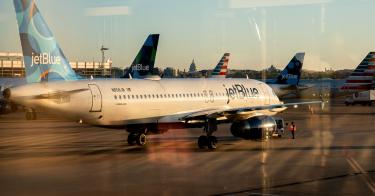In the name of consumer protections, the Biden administration and several state attorneys general are going to force consumers to pay higher airfares. Shortly after JetBlue Airways and Spirit Airlines announced a merger, they were sued by the Justice Department, six states, and the District of Columbia to stop the merger, which would ultimately mean lower fares for more Americans.
Why sue to stop these airlines from combining? It certainly can’t be because of size, since the Biden administration is not trying to break up the much larger four main domestic carriers. American Airlines has 17.5% of the market, Delta Air Lines 17.3%, Southwest Airlines 16.9% and United Airlines 15.6%. JetBlue and Spirit combined would be only 10.4%.
That means United would still be 50% bigger than the merged company by market share and American would be almost 70% bigger. The federal government is aware of this, since it cleared the very mergers that created the four largest carriers. So instead of blaming size, the Justice Department claims the merger would harm consumers by $1 billion annually in the form of higher fares.
But that argument is fundamentally flawed. If the merger did increase prices to consumers on net balance, it would completely undermine the business model of both JetBlue and Spirit.
>>> America Is Taking a High-Speed Train to Bankruptcy
Because the four major domestic carriers are so large, they benefit from tremendous economies of scale, allowing them to have, on average, slimmer margins on each seat and to rely on the sheer volume of tickets sold for their profits. This also makes flying larger planes possible. That business model is profitable in most markets, but not all, leaving niches for JetBlue and Spirit to fill.
Those two carriers often compete with their larger rivals by offering the least expensive, no-frills option to get from point A to point B. For some consumers, that’s the best option, and they take these cheaper flights over those of the larger carriers.
JetBlue and Spirit also serve many areas that have been abandoned by the major carriers because those locations don’t have enough volume to achieve the economies of scale needed by the four biggest airlines.
Those suing to stop the merger in this case have no explanation as to why the new company would simply stop serving these smaller areas. If they are profitable now, they should be more so when the new company has the greater flexibility of a larger fleet, more staff, and greater capital reserve. Airports that today are served only by either JetBlue or Spirit would not have less competition.
The Justice Department also has a fundamental misunderstanding about who is the chief competition of either JetBlue or Spirit; it is not each other, but the four larger airlines. The merger would not eliminate the competition between JetBlue and Spirit so much as it would allow the new, combined company to better compete with its larger rivals.
>>> Biden Administration Now Wants to Ban Furnaces
Even still, the resultant carrier would not have the same economies of scale as the four largest airlines, so it would need to keep filling the niche of being an economical choice for consumers in most markets. Abandoning that business model would put the merged company at a significant disadvantage to its rivals and would, in turn, reduce profits.
If the merged company were so foolish as to raise prices to the levels charged by the four largest carriers, then it would lose all its business. Faced with a bare-bones flying experience or a full-service one for the same price, people will choose the latter. The new airline would lose money by charging fares comparable to those of its larger competitors.
For example, Southwest’s economies of scale allow it to accommodate two free checked bags for each passenger, something smaller airlines cannot offer. But the Justice Department and the state attorneys general suing to block the merger don’t seem to understand this, or the airline industry at all. In the name of protecting consumers, they would deprive them of cheaper airfares.
This piece originally appeared in The Washington Times




